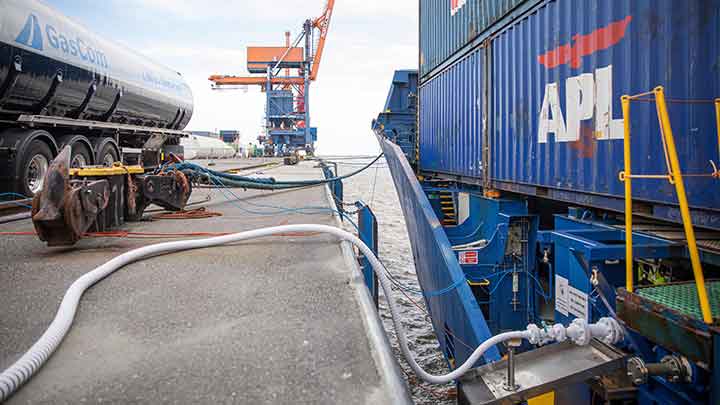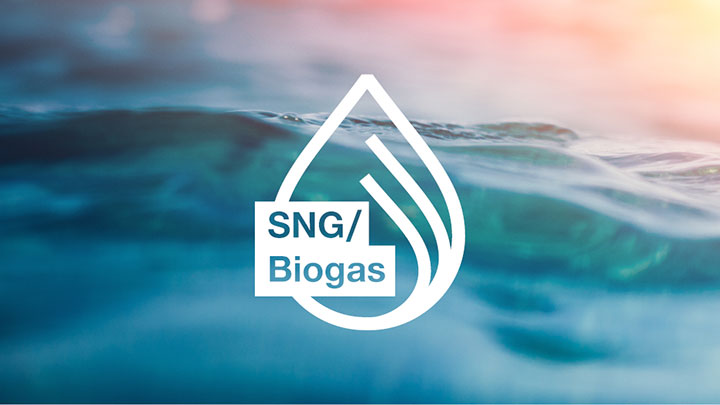SNG: Synthetic gas for the maritime transition

A viable path to decarbonization
MAN Energy Solutions is driving the maritime energy transition with technologies for low-carbon fuels, including green engines and retrofits. Our synthetic natural gas (SNG) solutions offer you a clear path to low-carbon shipping.

From HFO to LNG to SNG
Most of the world's ships run on heavy fuel oil (HFO). The climate crisis has made it essential to find low-carbon alternatives. In recent years, liquefied natural gas (LNG) has become the alternative of choice, but it still a fossil fuel that produces greenhouse gases (GHG). SNG is a new low-carbon alternative. SNG is chemically the same as the main combustible constituent of LNG, so it can used as a direct replacement or blended with LNG, depending on the supply.
SNG as maritime fuel
SNG is optimally suited for the two- and four-stroke dual-fuel engines in MAN’s range and ideal for ships that already run on LNG and aim to save additional emissions. Achieving fuel supply aboard ship is straightforward enough with the right equipment – as with LNG. The new gaseous fuel has to be held at cryogenic temperatures prior to bunkering (-162°C). However, an already established LNG infrastructure can also be used for fueling with SNG.
Reference case: ElbBLUE
World’s first use of SNG in commercial shipping
In September 2021, the 1,036-TEU vessel ElbBLUE, which had been retrofitted with a four-stroke MAN 51/60 dual-fuel engine in 2017, also became the first container ship worldwide to use climate-neutral SNG on a commercial trip. The ship replaced approximately 50% of its bunkered gas fuel with SNG from the Kiwi AG plant in Wertle, Germany. The test proved that any LNG-retrofitted ship can run on carbon-neutral fuels generated by Power-to-X technology.
Read moreManaging Methane Slip
Does the issue of methane slip affect the climate benefits of LNG as an engine fuel for marine applications? Download this paper and find out more about the various countermeasures the company has taken for this purpose.
Synthetic natural gas (SNG) can be derived from fossil fuels and biomass via gasification and methanation processes. SNG can also be produced by, for example, renewable or surplus energy in power-to-gas systems. Biogases are produced from biomass and waste products – and the resulting liquefied fuels can be referred to as BioLNG or LBG (liquefied biogas) and sometimes LBM (liquefied biomethane).
Main advantages:
- SNG and Biogas have the same low NOx, SOx and particulate matter emissions as LNG, but they can be CO2 neutral depending on the feedstock and conversion energy source
- Depending on the source fuel, SNG and Biogas can be a carbon-neutral substitute for fossil fuels
- SNG and Biogas can be blended with LNG to gradually reduce the CO2 footprint
- Considered to be excellent bridging fuels during the ongoing energy transition
Focus areas:
- The availability of SNG and Biogas as bunker fuel
- Increase of production capacities Read more

Solutions / technologies by MAN Energy Solutions:
Two-stroke:
|
|
| Four-stroke: |
|
| Cryogenic equipment |
|
Other future fuels
Related news
Methanol-Fuelled MAN 21/31DF-M GenSet Secures First Propulsion Order
MAN Energy Solutions has received an order for 3 × MAN 6L21/31DF-M (Dual Fuel-Methanol) GenSets capable of running on methanol in connection with the construction of a 7,990 dwt IMO Type II chemical bunker tanker.
The dual-fuel engines will form part of a diesel-electric propulsion system on board the vessel with electrical motors driving twin fixed-pitch propellers via gearboxes; an onboard battery-storage system will optimise the use of the dual-fuelled generators. MAN Energy Solutions’ licensee, CMP – an engine-manufacturing division of Chinese State Shipbuilding Corporation (CSSC) – will build the engines in China and the vessel is scheduled for delivery during Q4, 2025.
The newbuild will operate at the port of Singapore under charter to deliver marine fuels. The port itself is reported as laying plans for the steady supply of methanol from 2025 onwards in order to meet future, anticipated bunkering requirements for methanol-fuelled vessels.
Bjarne Foldager – Country Manager, Denmark – MAN Energy Solutions, said: “Seeing our trusted MAN L21/31 GenSets go into these ships as a methanol-fuelled version shows that maritime decarbonisation is a prominent consideration for shipowners in all vessel segments and sizes. It also clearly illustrates, regardless of the market one serves as shipowner, that our broad, dual-fuel portfolio enables everyone to take part in the green transition.”
Thomas S. Hansen – Head of Sales and Promotion – MAN Energy Solutions, said: “The MAN L21/31 engine is well-established in the market having racked up some 2,750 sales. The reliability of its cost-effective, port fuel-injection concept now prominently positions the 21/31DF-M as the preferred, medium-speed, small-bore engine for GenSet and diesel-electric propulsion solutions, while also meeting market demands to balance both CAPEX and OPEX. With the shipping market currently experiencing an increased interest in methanol as marine fuel, and orders for methanol-fuelled ships steadily growing as part of many companies’ decarbonisation strategy, we feel that the introduction of this dual-fuel engine is timely.”
Documents
-
PR Holeby 21.31DF-M_EN
Contact
Nils Søholt
Trade Press Marine
Group Communications & MarktingMAN Energy SolutionsTeglholmsgade 412450 Copenhagen SVDenmark
nils.soeholt@man-es.com t +45 33 85 26 69Available languages
- DE ·
- EN
